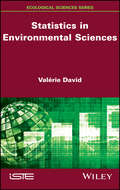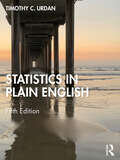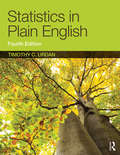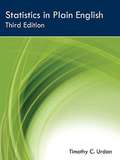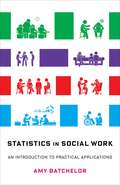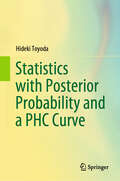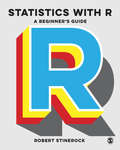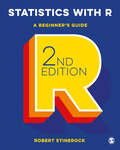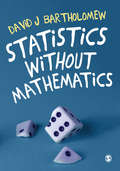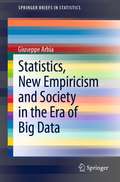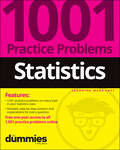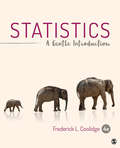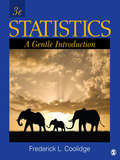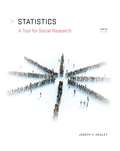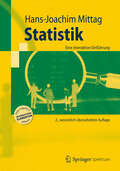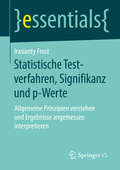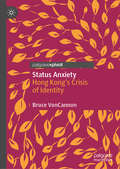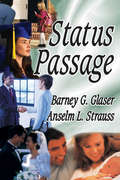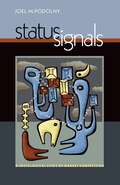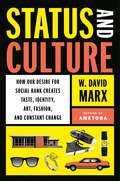- Table View
- List View
Statistics in Environmental Sciences
by Valerie DavidStatistical tools are indispensable for the environmental sciences. They have become an integral part of the scientific process, from the development of the sampling plan to the obtainment of results. Statistics in Environmental Sciences provides the foundation for the interpretation of quantitative data (basic vocabulary, main laws of probabilities, etc.) and the thinking behind sampling and experimental methodology. It also introduces the principles of statistical tests such as decision theory and examines the key choices in statistical tests, while keeping the established objectives in mind. The book examines the most used statistics in the field of environmental sciences. Detailed descriptions based on concrete examples are given, as well as descriptions obtained through the use of the free software R (whose usage is also presented).
Statistics in Plain English
by Timothy C. UrdanStatistics in Plain English is a straightforward, conversational introduction to statistics that delivers exactly what its title promises. Each chapter begins with a brief overview of a statistic (or set of statistics) that describes what the statistic does and when to use it, followed by a detailed step-by-step explanation of how the statistic works and exactly what information it provides. Chapters also include an example of the statistic (or statistics) used in real-world research, "Worked Examples," "Writing It Up" sections that demonstrate how to write about each statistic, "Wrapping Up and Looking Forward" sections, and practice work problems. Thoroughly updated throughout, this edition features several key additions and changes. First, a new chapter on person-centered analyses, including cluster analysis and latent class analysis (LCA) has been added, providing an important alternative to the more commonly used variable-centered analyses (e.g., t tests, ANOVA, regression). Next, the chapter on non-parametric statistics has been enhanced with in-depth descriptions of Mann-Whitney U, Kruskal-Wallis, and Wilcoxon Signed-Rank analyses, in addition to the detailed discussion of the Chi-square statistic found in the previous edition. These nonparametric statistics are widely used when dealing with nonnormally distributed data. This edition also includes more information about the assumptions of various statistics, including a detailed explanation of the assumptions and consequences of violating the assumptions of regression, as well as more coverage of the normal distribution in statistics. Finally, the book features a multitude of real-world examples throughout to aid student understanding and provides them with a solid understanding of how several statistics techniques commonly used by researchers in the social sciences work. Statistics in Plain English is suitable for a wide range of readers, including students taking their first statistics course, professionals who want to refresh their statistical memory, and undergraduate or graduate students who need a concise companion to a more complicated text used in their class. The text works as a standalone or as a supplement and covers a range of statistical concepts from descriptive statistics to factor analysis and person-centered analyses.
Statistics in Plain English, Fourth Edition
by Timothy C. UrdanThis introductory textbook provides an inexpensive, brief overview of statistics to help readers gain a better understanding of how statistics work and how to interpret them correctly. Each chapter describes a different statistical technique, ranging from basic concepts like central tendency and describing distributions to more advanced concepts such as t tests, regression, repeated measures ANOVA, and factor analysis. Each chapter begins with a short description of the statistic and when it should be used. This is followed by a more in-depth explanation of how the statistic works. Finally, each chapter ends with an example of the statistic in use, and a sample of how the results of analyses using the statistic might be written up for publication. A glossary of statistical terms and symbols is also included. Using the author's own data and examples from published research and the popular media, the book is a straightforward and accessible guide to statistics. New features in the fourth edition include: sets of work problems in each chapter with detailed solutions and additional problems online to help students test their understanding of the material, new "Worked Examples" to walk students through how to calculate and interpret the statistics featured in each chapter, new examples from the author's own data and from published research and the popular media to help students see how statistics are applied and written about in professional publications, many more examples, tables, and charts to help students visualize key concepts, clarify concepts, and demonstrate how the statistics are used in the real world. a more logical flow, with correlation directly preceding regression, and a combined glossary appearing at the end of the book, a Quick Guide to Statistics, Formulas, and Degrees of Freedom at the start of the book, plainly outlining each statistic and when students should use them, greater emphasis on (and description of) effect size and confidence interval reporting, reflecting their growing importance in research across the social science disciplines an expanded website at www.routledge.com/cw/urdan with PowerPoint presentations, chapter summaries, a new test bank, interactive problems and detailed solutions to the text's work problems, SPSS datasets for practice, links to useful tools and resources, and videos showing how to calculate statistics, how to calculate and interpret the appendices, and how to understand some of the more confusing tables of output produced by SPSS. Statistics in Plain English, Fourth Edition is an ideal guide for statistics, research methods, and/or for courses that use statistics taught at the undergraduate or graduate level, or as a reference tool for anyone interested in refreshing their memory about key statistical concepts. The research examples are from psychology, education, and other social and behavioral sciences.
Statistics in Plain English, Third Edition
by Timothy C. UrdanThis inexpensive paperback provides a brief, simple overview of statistics to help readers gain a better understanding of how statistics work and how to interpret them correctly. Each chapter describes a different statistical technique, ranging from basic concepts like central tendency and describing distributions to more advanced concepts such as t tests, regression, repeated measures ANOVA, and factor analysis. Each chapter begins with a short description of the statistic and when it should be used. This is followed by a more in-depth explanation of how the statistic works. Finally, each chapter ends with an example of the statistic in use, and a sample of how the results of analyses using the statistic might be written up for publication. A glossary of statistical terms and symbols is also included. New features in the third edition include: a new chapter on Factor and Reliability Analysis especially helpful to those who do and/or read survey research, new "Writing it Up" sections demonstrate how to write about and interpret statistics seen in books and journals, a website at http://www.psypress.com/statistics-in-plain-english with PowerPoint presentations, interactive problems (including an overview of the problem's solution for Instructors) with an IBM SPSS dataset for practice, videos of the author demonstrating how to calculate and interpret most of the statistics in the book, links to useful websites, and an author blog, new section on understanding the distribution of data (ch. 1) to help readers understand how to use and interpret graphs, many more examples, tables, and charts to help students visualize key concepts. Statistics in Plain English, Third Edition is an ideal supplement for statistics, research methods, and/or for courses that use statistics taught at the undergraduate or graduate level, or as a reference tool for anyone interested in refreshing their memory about key statistical concepts. The research examples are from psychology, education, and other social and behavioral sciences.
Statistics in Social Work: An Introduction to Practical Applications
by Professor Amy BatchelorUnderstanding statistical concepts is essential for social work professionals. It is key to understanding research and reaching evidence-based decisions in your own practice—but that is only the beginning. If you understand statistics, you can determine the best interventions for your clients. You can use new tools to monitor and evaluate the progress of your client or team. You can recognize biased systems masked by complex models and the appearance of scientific neutrality. For social workers, statistics are not just math, they are a critical practice tool.This concise and approachable introduction to statistics limits its coverage to the concepts most relevant to social workers. Statistics in Social Work guides students through concepts and procedures from descriptive statistics and correlation to hypothesis testing and inferential statistics. Besides presenting key concepts, it focuses on real-world examples that students will encounter in a social work practice. Using concrete illustrations from a variety of potential concentrations and populations, Amy Batchelor creates clear connections between theory and practice—and demonstrates the important contributions statistics can make to evidence-based and rigorous social work practice.
Statistics with Posterior Probability and a PHC Curve
by Hideki ToyodaThis textbook reconstructs the statistics curriculum from the perspective of posterior probability. In recent years, there have been several reports that the results of studies using significant tests cannot be reproduced. It is a problem called a “reproducibility crisis”. For example, suppose we could reject the null hypothesis that “the average number of days to recovery in patients who took a new drug was the same as that in the control group”. However, rejecting the null hypothesis is only a necessary condition for the new drug to be effective. Even if the necessary conditions are met, it does not necessarily mean that the new drug is effective. In fact, there are many cases where the effect is not reproduced. Sufficient conditions should be presented, such as “the average number of days until recovery in patients who take new drugs is sufficiently short compared to the control group, evaluated from a medical point of view”, without paying attention to necessary conditions. This book reconstructs statistics from the perspective of PHC, i.e., probability that a research hypothesis is correct. For example, the PHC curve shows the posterior probability that the statement “The average number of days until recovery for patients taking a new drug is at least θ days shorter than that of the control group” is correct as a function of θ. Using the PHC curve makes it possible to discuss the sufficient conditions rather than the necessary conditions for being an efficient treatment. The value of statistical research should be evaluated with concrete indicators such as “90% probability of being at least 3 days shorter”, not abstract metrics like the p-value.
Statistics with R: A Beginner's Guide
by Robert StinerockThe dynamic, student focused textbook provides step-by-step instruction in the use of R and of statistical language as a general research tool. It is ideal for anyone hoping to: Complete an introductory course in statistics Prepare for more advanced statistical courses Gain the transferable analytical skills needed to interpret research from across the social sciences Learn the technical skills needed to present data visually Acquire a basic competence in the use of R. The book provides readers with the conceptual foundation to use applied statistical methods in everyday research. Each statistical method is developed within the context of practical, real-world examples and is supported by carefully developed pedagogy and jargon-free definitions. Theory is introduced as an accessible and adaptable tool and is always contextualized within the pragmatic context of real research projects and definable research questions. Author Robert Stinerock has also created a wide range of online resources, including: R scripts, complete solutions for all exercises, data files for each chapter, video and screen casts, and interactive multiple-choice quizzes.
Statistics with R: A Beginner's Guide
by Robert StinerockThe dynamic, student focused textbook provides step-by-step instruction in the use of R and of statistical language as a general research tool. It is ideal for anyone hoping to: Complete an introductory course in statistics Prepare for more advanced statistical courses Gain the transferable analytical skills needed to interpret research from across the social sciences Learn the technical skills needed to present data visually Acquire a basic competence in the use of R. The book provides readers with the conceptual foundation to use applied statistical methods in everyday research. Each statistical method is developed within the context of practical, real-world examples and is supported by carefully developed pedagogy and jargon-free definitions. Theory is introduced as an accessible and adaptable tool and is always contextualized within the pragmatic context of real research projects and definable research questions. Author Robert Stinerock has also created a wide range of online resources, including: R scripts, complete solutions for all exercises, data files for each chapter, video and screen casts, and interactive multiple-choice quizzes.
Statistics with R: A Beginner′s Guide
by Robert StinerockStatistics is made simple with this award-winning guide to using R and applied statistical methods. With a clear step-by-step approach explained using real world examples, learn the practical skills you need to use statistical methods in your research from an expert with over 30 years of teaching experience. With a wealth of hands-on exercises and online resources created by the author, practice your skills using the data sets and R scripts from the book with detailed screencasts that accompany each script. This book is ideal for anyone looking to: • Complete an introductory course in statistics • Prepare for more advanced statistical courses • Gain the transferable analytical skills needed to interpret research from across the social sciences • Learn the technical skills needed to present data visually • Acquire a basic competence in the use of R and RStudio. This edition also includes a gentle introduction to Bayesian methods integrated throughout. The author has created a wide range of online resources, including: over 90 R scripts, 36 datasets, 37 screen casts, complete solutions for all exercises, and 130 multiple-choice questions to test your knowledge.
Statistics with R: A Beginner′s Guide
by Robert StinerockStatistics is made simple with this award-winning guide to using R and applied statistical methods. With a clear step-by-step approach explained using real world examples, learn the practical skills you need to use statistical methods in your research from an expert with over 30 years of teaching experience. With a wealth of hands-on exercises and online resources created by the author, practice your skills using the data sets and R scripts from the book with detailed screencasts that accompany each script. This book is ideal for anyone looking to: • Complete an introductory course in statistics • Prepare for more advanced statistical courses • Gain the transferable analytical skills needed to interpret research from across the social sciences • Learn the technical skills needed to present data visually • Acquire a basic competence in the use of R and RStudio. This edition also includes a gentle introduction to Bayesian methods integrated throughout. The author has created a wide range of online resources, including: over 90 R scripts, 36 datasets, 37 screen casts, complete solutions for all exercises, and 130 multiple-choice questions to test your knowledge.
Statistics without Mathematics
by David J BartholomewThis is a book about the ideas that drive statistics. It is an ideal primer for students who need an introduction to the concepts of statistics without the added confusion of technical jargon and mathematical language. It introduces the intuitive thinking behind standard procedures, explores the process of informal reasoning, and uses conceptual frameworks to provide a foundation for students new to statistics. It showcases the expertise we have all developed from living in a data saturated society, increases our statistical literacy and gives us the tools needed to approach statistical mathematics with confidence. Key topics include: Variability Standard Distributions Correlation Relationship Sampling Inference An engaging, informal introduction this book sets out the conceptual tools required by anyone undertaking statistical procedures for the first time or for anyone needing a fresh perspective whilst studying the work of others.
Statistics without Mathematics
by David J BartholomewThis is a book about the ideas that drive statistics. It is an ideal primer for students who need an introduction to the concepts of statistics without the added confusion of technical jargon and mathematical language. It introduces the intuitive thinking behind standard procedures, explores the process of informal reasoning, and uses conceptual frameworks to provide a foundation for students new to statistics. It showcases the expertise we have all developed from living in a data saturated society, increases our statistical literacy and gives us the tools needed to approach statistical mathematics with confidence. Key topics include: Variability Standard Distributions Correlation Relationship Sampling Inference An engaging, informal introduction this book sets out the conceptual tools required by anyone undertaking statistical procedures for the first time or for anyone needing a fresh perspective whilst studying the work of others.
Statistics, New Empiricism and Society in the Era of Big Data (SpringerBriefs in Statistics)
by Giuseppe ArbiaThis book reveals the myriad aspects of Big Data collection and analysis, by defining and clarifying the meaning of Big Data and its unique characteristics in a non-technical and easy-to-follow way. Moreover, it discusses critical issues and problems related to the Big Data revolution and their implications for both Statistics as a discipline and for our everyday lives. The author identifies various problems and limitations in the quantitative analysis of Big Data, with regard to e.g. its volume, velocity and variety, as well as its reliability and veridicity. Dedicated chapters focus on the epistemological aspects of data-based knowledge and ethical aspects of the use of Big Data, while also addressing paradigmatic cases such as Cambridge Analytica and the use of data from social networks to influence election outcomes.
Statistics: 1001 Practice Problems For Dummies (+ Free Online Practice)
by The Experts at DummiesBecome more likely to succeed—gain stats mastery with Dummies Statistics: 1001 Practice Problems For Dummies gives you 1,001 opportunities to practice solving problems from all the major topics covered in Statistics classes—in the book and online! Get extra help with tricky subjects, solidify what you’ve already learned, and get in-depth walk-throughs for every problem with this useful book. These practice problems and detailed answer explanations will help you gain a valuable working knowledge of statistics, no matter what your skill level. Thanks to Dummies, you have a resource to help you put key stats concepts into practice. Work through practice problems on all Statistics topics covered in school classes Read through detailed explanations of the answers to build your understanding Access practice questions online to study anywhere, any time Improve your grade and up your study game with practice, practice, practiceThe material presented in Statistics: 1001 Practice Problems For Dummies is an excellent resource for students, as well as parents and tutors looking to help supplement Statistics instruction. Statistics: 1001 Practice Problems For Dummies (9781119883593) was previously published as 1,001 Statistics Practice Problems For Dummies (9781118776049). While this version features a new Dummies cover and design, the content is the same as the prior release and should not be considered a new or updated product.
Statistics: A Gentle Introduction
by Frederick L. CoolidgeThe Fourth Edition of Statistics: A Gentle Introduction shows students that an introductory statistics class doesn’t need to be difficult or dull. This text minimizes students’ anxieties about math by explaining the concepts of statistics in plain language first, before addressing the math. Each formula within the text has a step-by-step example to demonstrate the calculation so students can follow along. Only those formulas that are important for final calculations are included in the text so students can focus on the concepts, not the numbers. A wealth of real-world examples and applications gives a context for statistics in the real world and how it helps us solve problems and make informed choices. New to the Fourth Edition are sections on working with big data, new coverage of alternative non-parametric tests, beta coefficients, and the "nocebo effect," discussions of p values in the context of research, an expanded discussion of confidence intervals, and more exercises and homework options under the new feature "Test Yourself." Included with this title: The password-protected Instructor Resource Site (formally known as SAGE Edge) offers access to all text-specific resources, including a test bank and editable, chapter-specific PowerPoint® slides.
Statistics: A Gentle Introduction
by Frederick L. CoolidgeThe Fourth Edition of Statistics: A Gentle Introduction shows students that an introductory statistics class doesn’t need to be difficult or dull. This text minimizes students’ anxieties about math by explaining the concepts of statistics in plain language first, before addressing the math. Each formula within the text has a step-by-step example to demonstrate the calculation so students can follow along. Only those formulas that are important for final calculations are included in the text so students can focus on the concepts, not the numbers. A wealth of real-world examples and applications gives a context for statistics in the real world and how it helps us solve problems and make informed choices. New to the Fourth Edition are sections on working with big data, new coverage of alternative non-parametric tests, beta coefficients, and the "nocebo effect," discussions of p values in the context of research, an expanded discussion of confidence intervals, and more exercises and homework options under the new feature "Test Yourself." Included with this title: The password-protected Instructor Resource Site (formally known as SAGE Edge) offers access to all text-specific resources, including a test bank and editable, chapter-specific PowerPoint® slides.
Statistics: A Gentle Introduction (3rd Edition)
by Frederick L. CoolidgeWith Statistics: A Gentle Introduction, Third Edition, an introductory stats class needn't be difficult or dull! Frederick L. Coolidge specifically designed his text to curtail students' anxieties and minimize unnecessary formulas, while providing a comprehensive review of basic statistical designs and analyses. A wealth of additional real-world examples have been included to give a sense of how the science of statistics works, solves problems, and helps us make informed choices about the world we live in. The author minimizes the use of formulas, but provides a step-by-step approach to their solution, and includes a glossary of key terms, symbols, and definitions at the end of each chapter. Every chapter also includes a short story about historical and contemporary statisticians who figured prominently in the evolution of the discipline of statistics. New to the Third Edition is the thorough incorporation of SPSS throughout, more visual material and figures, and an enhanced treatment of effect sizes, and more detailed explanation of statistical concepts.
Statistics: A Tool For Social Research (Tenth Edition)
by Joseph F. HealeyPacked with everyday examples of statistics in the real world, STATISTICS: A TOOL FOR SOCIAL RESEARCH, 10e, provides a reader-friendly introduction to the fundamental concepts of statistics and their practical application to a wide variety of contemporary social issues. Using myriad examples of statistics from daily life, the text demonstrates that statistics are not just abstract mathematical constructs but have practical value in government, education, business, media, politics, sports, and much more. STATISTICS helps you understand the importance of statistical fundamentals in research without requiring advanced mathematical knowledge. It supports effective learning for both math-averse beginners as well as more advanced students in diverse social science disciplines. Focusing on the application of computational research in favor of the computations themselves, the text fully integrates with the most current version of IBM's SPSS software and labels end-of-chapter SPSS problems by the discipline from which they are drawn. The author breaks down even the most complex material to help you master key concepts and develop the skills you need to succeed as a professional in a social science field-or simply to become a "statistically literate" consumer of social research.
Statistik
by Hans-Joachim MittagBeim Multimedia-Comenius-Wettbewerb 2011 ausgezeichnet, bietet das Lehrbuch als Kombination aus Druckwerk und interaktiver Online-Fassung eine gelungene Einführung in die Statistik. Das Anwendungsspektrum der Statistik wird anhand aktueller Beispiele illustriert, die statistischen Konzepte in Grafiken visualisiert. Der Band enthält viele Übungsaufgaben mit ausführlichen Lösungen. Die überarbeitete 2. Auflage wird durch neue interaktive Experimente und tongestützte Animationen ergänzt und bietet frei zugängliche Multimedia-Ressourcen im Internet.
Statistik mit „R“ für Nicht-Mathematiker: Praktische Tipps für die quantitativ-empirische Bachelor-, Master- und Doktorarbeit (essentials)
by Karl-Heinz FittkauDas Schreiben einer quantitativ-empirischen Graduierungsarbeit ist wie das Kochen in einer Mensa. Es sollte schnell gehen, das Essen schmecken, gesund und kostengünstig sein. Um das zu erreichen, müssen Rezepte eingehalten werden. Ohne Leidenschaft, aber professionell. Dieses essential gibt Ihnen solche Rezepte an die Hand, die Sie nur nachkochen müssen. Wie ist eine solche Arbeit aufgebaut? Wie formuliere ich Hypothesen und wie überprüfe ich diese korrekt? Es wird der Umgang mit der kostenfreien Statistiksoftware „R“ erklärt. Die benötigte Syntax finden Sie im essential. Sie müssen sie lediglich kopieren.
Statistische Testverfahren, Signifikanz und p-Werte: Allgemeine Prinzipien verstehen und Ergebnisse angemessen interpretieren (essentials)
by Irasianty FrostDieses essential erklärt das grundlegende Prinzip statistischer Testverfahren. Dabei stehen die Bedeutung der statistischen Signifikanz sowie des p-Wertes im Fokus. Häufig anzutreffende Fehlinterpretationen werden angesprochen. Dadurch wird ersichtlich, was ein signifikantes Ergebnis aussagt und, was es nicht aussagt. Der Leser wird somit befähigt, adäquat mit Testergebnissen umzugehen.
Status Anxiety: Hong Kong's Crisis of Identity
by Bruce VonCannonIn this book, retired banking CEO Bruce VonCannon considers the past, present and future of Hong Kong, the dynamic finance-driven autonomous city that is beset by global issues- US–China tension, income inequality, housing scarcity, climate change- within the microcosm of a small island archipelago and a hyper-specific local culture. The Hong Kong Special Administrative Region is today one of the world’s foremost economic and financial hubs and a repository for 18% of the world’s stored wealth, home to the region’s most vibrant stock market, a major free trade port city and traditional gateway to mainland China, the world’s 2nd largest economy. The recent street protests which broke out in June 2019 have been described as a pro-democracy movement. However, other analysts disagree and argue that the street protests have more in common with the populist movements springing up in other parts of the world as the result of a growing divide between rich and poor. This book delves into financial realities, Hong Kong's position within the new global competition between China and the United States, and as a model for the urbanization of the future.
Status Passage
by Anselm L. StraussThe French writer Arnold van Gennep first called attention to the phenomena of status passages in his Rites of Passage one hundred years ago. In Status Passage, first published in 1971, the movement of individuals and groups in contemporary society from one status to another is examined in the light of Gennep's original theory. Glaser and Strauss demonstrate that society emerges as a comparative order. In this order, every organized action, collective or individual, can be seen as a form of status passage.From one status to another-from childhood to adolescence to adulthood, from being single to being married, movement from one income group, social class or religion to another-there are passages that entail movement into different parts of a social structure and loss or gain in privileges. Types of status passage are described by their proper ties. The authors present a formal theory of status passage in the form of a running theoretical discussion.The concepts and categories discussed in Status Passage are illuminated by a large number of examples chosen from a wide range of human behavior, and the applicability of the theory to still other examples is made apparent. The result is a stimulating and provocative book that will interest a wide range of sociologists, social psychologists, and other social scientists, and will be useful in a variety of courses.
Status Signals: A Sociological Study of Market Competition
by Joel M. PodolnyWhy are elite jewelers reluctant to sell turquoise, despite strong demand? Why did leading investment bankers shun junk bonds for years, despite potential profits? Status Signals is the first major sociological examination of how concerns about status affect market competition. Starting from the basic premise that status pervades the ties producers form in the marketplace, Joel Podolny shows how anxieties about status influence whom a producer does (or does not) accept as a partner, the price a producer can charge, the ease with which a producer enters a market, how the producer's inventions are received, and, ultimately, the market segments the producer can (and should) enter. To achieve desired status, firms must offer more than strong past performance and product quality--they must also send out and manage social and cultural signals. Through detailed analyses of market competition across a broad array of industries--including investment banking, wine, semiconductors, shipping, and venture capital--Podolny demonstrates the pervasive impact of status. Along the way, he shows how corporate strategists, tempted by the profits of a market that would negatively affect their status, consider not only whether to enter the market but also whether they can alter the public's perception of the market. Podolny also examines the different ways in which a firm can have status. Wal-Mart, for example, has low status among the rich as a place to shop, but high status among the rich as a place to invest. Status Signals provides a systematic understanding of market dynamics that have--until now--not been fully appreciated.
Status and Culture: How Our Desire for Social Rank Creates Taste, Identity, Art, Fashion, and Constant Change
by W. David Marx"Subtly altered how I see the world." —Michelle Goldberg, New York Times&“[Status and Culture] consistently posits theories I'd never previously considered that instantly feel obvious.&” —Chuck Klosterman, author of The Nineties&“Why are you the way that you are? Status and Culture explains nearly everything about the things you choose to be—and how the society we live in takes shape in the process.&” —B.J. Novak, writer and actorSolving the long-standing mysteries of culture—from the origin of our tastes and identities, to the perpetual cycles of fashions and fads—through a careful exploration of the fundamental human desire for statusAll humans share a need to secure their social standing, and this universal motivation structures our behavior, forms our tastes, determines how we live, and ultimately shapes who we are. We can use status, then, to explain why some things become &“cool,&” how stylistic innovations arise, and why there are constant changes in clothing, music, food, sports, slang, travel, hairstyles, and even dog breeds.In Status and Culture, W. David Marx weaves together the wisdom from history, psychology, sociology, anthropology, economics, philosophy, linguistics, semiotics, cultural theory, literary theory, art history, media studies, and neuroscience to demonstrate exactly how individual status seeking creates our cultural ecosystem. Marx examines three fundamental questions: Why do individuals cluster around arbitrary behaviors and take deep meaning from them? How do distinct styles, conventions, and sensibilities emerge? Why do we change behaviors over time and why do some behaviors stick around? The answers then provide new perspectives for understanding the seeming &“weightlessness&” of internet culture. Status and Culture is a book that will appeal to business people, students, creators, and anyone who has ever wondered why things become popular, why their own preferences change over time, and how identity plays out in contemporary society. Readers of this book will walk away with deep and lasting knowledge of the often secret rules of how culture really works.
